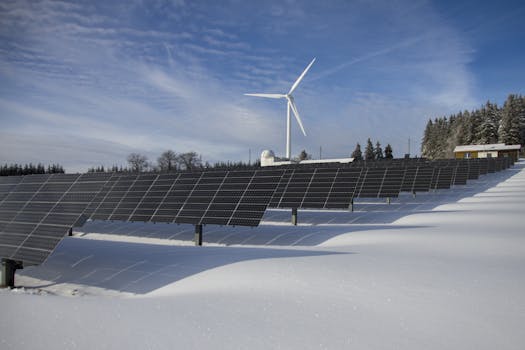Renewable Energy Sources and Their Impact
Renewable energy sources are essential in the global effort to reduce greenhouse gas emissions and combat climate change. The transition from fossil fuels to renewable energy not only promises a cleaner environment but also offers numerous economic and social benefits. This article explores the various types of renewable energy sources, their impact on the environment, and the broader implications for society and the economy.

Types of Renewable Energy Sources
Renewable energy comes from natural resources that are replenished constantly. These include solar, wind, hydroelectric, geothermal, and biomass energy. Each type has unique characteristics and benefits.
- Solar Energy: Solar power harnesses energy from the sun using photovoltaic cells. It's one of the most abundant and sustainable sources of energy available.
- Wind Energy: Wind turbines convert kinetic energy from wind into mechanical power. This form of energy is particularly effective in areas with consistent wind patterns.
- Hydroelectric Energy: This involves generating electricity by harnessing the flow of water, typically through dams. It is one of the oldest and most established forms of renewable energy.
- Geothermal Energy: Geothermal power utilizes heat from beneath the Earth's surface to generate electricity. It's a reliable source with a small environmental footprint.
- Biomass Energy: Biomass involves converting organic materials into energy. This can include anything from wood chips to agricultural waste.
Environmental Impact
The environmental benefits of renewable energy are significant. Unlike fossil fuels, renewable energy sources produce little to no greenhouse gases or pollutants. For instance, solar and wind power generate electricity without emitting carbon dioxide (CO2), which is a major contributor to global warming.
A study by the National Renewable Energy Laboratory (NREL) highlights that widespread adoption of renewable energy could reduce CO2 emissions by 80% by 2050 (nrel.gov). Additionally, renewable energy projects often require less water compared to traditional power plants, helping conserve this vital resource.
| Energy Source | CO2 Emissions (g/kWh) | Water Usage (liters/MWh) |
|---|---|---|
| Solar | 0 | 1-3 |
| Wind | 0 | <1 |
| Hydroelectric | <5 | 20-30 |
| Nuclear | <15 | 30-40 |
| Coal | >900 | >1000 |
Economic Impact
The shift to renewable energy also has substantial economic implications. Investments in renewable technologies create jobs in manufacturing, installation, and maintenance. According to the International Renewable Energy Agency (IRENA), the renewable energy sector employed over 11 million people globally in 2018 (irena.org). This number is expected to grow as more countries adopt green policies.
Apart from job creation, renewable energy reduces dependency on imported fuels, enhancing national energy security. Countries that invest in local renewable resources can decrease their exposure to volatile fossil fuel markets and improve their trade balances.
Social Impact and Community Benefits
The social benefits of renewable energy extend beyond job creation. Communities that embrace renewable projects often experience improved public health due to reduced air pollution. For example, replacing coal-fired power plants with wind or solar farms can lead to fewer respiratory illnesses and cardiovascular diseases among local populations.
Moreover, decentralized renewable energy systems can provide electricity to remote areas that lack access to the central grid. This enhances quality of life by powering schools, hospitals, and homes with clean energy.
Renewable Energy moving forward
Innovations such as improved battery storage solutions are addressing intermittency issues associated with solar and wind power. In addition to this, government policies worldwide are increasingly supportive of renewables through subsidies, tax incentives, and regulatory frameworks that encourage clean energy adoption. For instance, the European Union has set ambitious targets to achieve climate neutrality by 2050 (ec.europa.eu).
The transition to renewable energy sources offers a multitude of environmental, economic, and social benefits. Solar, wind, hydroelectric, geothermal, and biomass energies each contribute uniquely to reducing greenhouse gas emissions and conserving natural resources. The positive impacts extend beyond cleaner air and water; they include job creation, enhanced public health, and greater energy security.